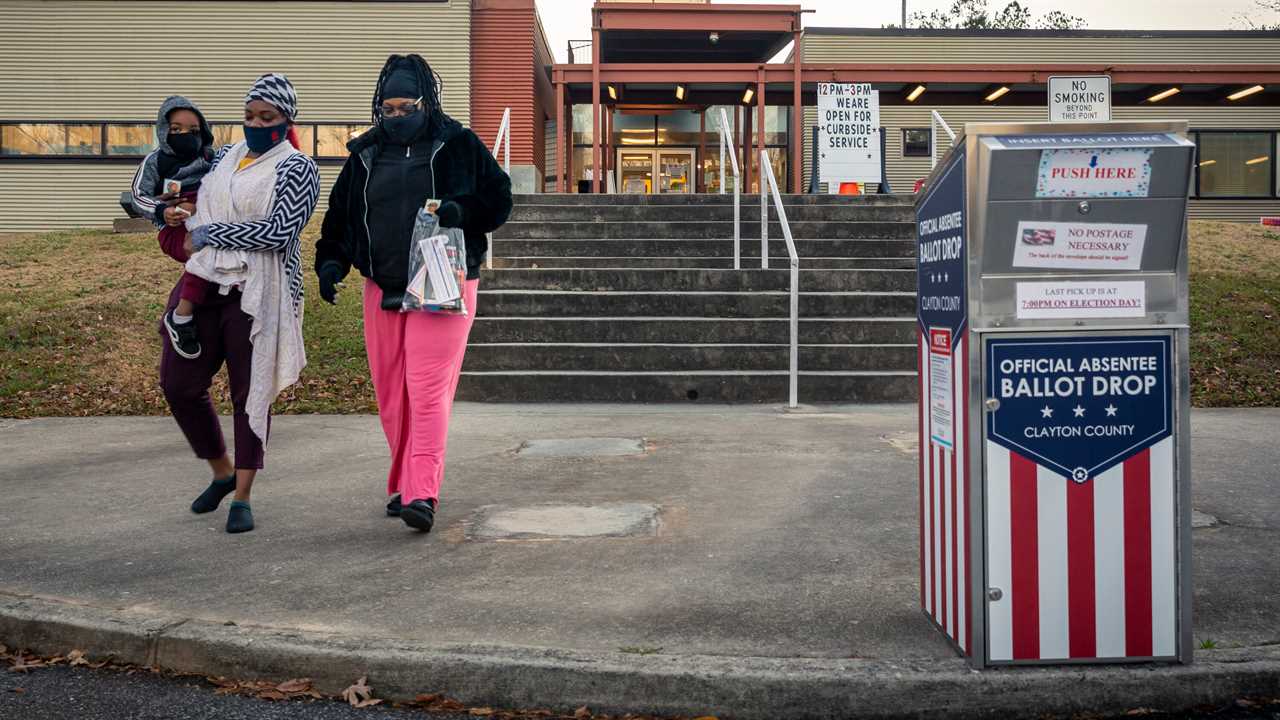
Georgia voters have two runoff elections, and control of the Senate, to decide on Tuesday. Here’s a look at the four candidates’ lives and careers.
Kelly Loeffler, a Republican appointed a year ago, has become deeply loyal to Trump.
Senator Kelly Loeffler, 50, has spent the campaign telling audiences that she has “lived the American dream,” pitching herself as a modest farm girl who worked her way through college before becoming a financial executive and co-owner of the Atlanta Dream, a W.N.B.A. team.
Ms. Loeffler is the daughter of a wealthy farming family from central Illinois, who inherited large tracts of rich agricultural land when she was in her early 20s. Her husband, Jeffrey Sprecher, is the chairman of the New York Stock Exchange and her largest campaign donor.
Until 2017, Ms. Loeffler was the chairwoman of a corporate foundation that matched small donations that her company’s employees made to many groups, including those that support abortion rights, among them Planned Parenthood, though she is a staunch opponent of abortion.
Before she was appointed last year, President Trump made clear that he supported a rival. Ms. Loeffler did not contribute to his 2016 campaign; she was previously known as a Republican donor eager to support more centrist candidates. But during this campaign, the first she has had to mount, she has portrayed herself as a steadfast ally of the president’s, boasting of her “100 percent Trump voting record” and backing his baseless attempts to subvert the election.
Raphael Warnock, a Democrat, wants to move from the pulpit to politics.
After spending his adult life preaching about politics from the church pulpit, the Rev. Raphael Warnock, 51, has decided to enter the political arena in a more direct route. For more than 15 years, he has spoken from one of the world’s most famous pulpits, Ebenezer Baptist Church, once the home of the Rev. Dr. Martin Luther King Jr.
Republicans have tried to portray Mr. Warnock as a dangerous radical, though he says his role is one of a moral compass. He has said some of his sermons are designed to make people uncomfortable, urging Black churches to be more accepting of gay people and criticizing them for being “shamefully slow” to focus on gender inequality. In his book, he criticized white churches for being participants “in slavery, segregation and other manifestations of white supremacy.”
Mr. Warnock grew up in a housing project in Savannah, Ga., where he was the 11th of 12 siblings. Both his father and mother were pastors. He gave his own first sermon at the age of 11 and, after graduating from Morehouse College, went on to Union Theological Seminary in New York, where he also worked as a youth minister at the Abyssinian Baptist Church, where another preacher-turned-politician, Adam Clayton Powell Jr., once led.
David Perdue, a Republican incumbent, puts his business experience at the core of his pitch.
David Perdue has made his international business experience the core of his political persona, presenting himself as a success story from rural Georgia who has navigated free markets across the globe while building his personal wealth.
And yet he has also embraced the populist, made-in-the-U.S.A., tariff-enacting approach of Mr. Trump. During his time as a top executive at companies that include Reebok, Sara Lee and Dollar General, Mr. Perdue was deeply involved in shifting manufacturing jobs to low-wage factories in China and other Asian countries.
Mr. Perdue, now 71, grew up in Warner Robins, a small city in central Georgia, and went on to Georgia Tech for his undergraduate and graduate degrees before entering the business world.
In his campaign, he has portrayed himself an paradigm of a Washington “outsider,” even though it was his cousin Sonny Perdue, the former governor of Georgia, who gave him his first experience in politics and mentored him through elections.
David Perdue has largely avoided directly engaging with his opponent in the race, Jon Ossoff, choosing not to participate in debates after Mr. Ossoff called him a “crook” over frequent stock trading during Mr. Perdue’s time as a senator.
Jon Ossoff, a Democrat, raised record sums in his bid to defeat Perdue.
At 33, Jon Ossoff has run the best-funded Senate campaign in history, raising more than $106 million in the final months of 2020 — almost $40 million more than his opponent.
Mr. Ossoff first appeared on the national political scene in 2017, when he ran for Congress in a special election — the first after Mr. Trump’s victory in 2016. That congressional race attracted attention, and money, from all over the country, though Mr. Ossoff lost in what became the most expensive House contest in history.
Yet after spending most of his career running a small documentary film company based in England from his home in Atlanta, Mr. Ossoff has little in the way of a record to run on, or against.
At 26, he was made chief executive of the film company without any journalism experience apart from an internship. As a teenager, Mr. Ossoff wrote a letter to John Lewis, the Georgia congressman and civil rights pioneer, later landing as a volunteer in Mr. Lewis’s office. Mr. Ossoff went on to work for Congressman Hank Johnson while he was still an undergraduate at Georgetown University.
During the campaign, Mr. Ossoff has cast himself as the latest in a long line of young people, including Mr. Lewis, who have taken leadership roles in liberal Southern politics.






